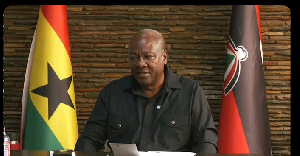Zeqblog Blog of Thursday, 19 December 2024
Source: Okine Isaac
Mahama raises alarms; Find out why

Former President John Dramani Mahama has expressed worry over the substantial system losses reported by the Electricity Company of Ghana (ECG), urging immediate and thorough reforms in the power distribution industry. The NDC flagbearer raised concern over the 32% system losses, which he termed as unsustainable and harmful to the country's energy sector.
Mahama underlined that significant system losses, which include both technical and economic losses, result in tremendous waste of electricity. He emphasized that for every 100 units of power generated, 32 are either squandered or stolen, putting a strain on the economy. The former president stated that such inefficiencies contribute to the rising cost of electricity, imposing a significant financial burden on Ghanaians.
During a speech at an event in Accra, Mahama lambasted the government for failing to address the ECG's difficulties despite repeated pleas for involvement. He asked all parties to work together to discover innovative ways to reduce losses, increase revenue collection, and update infrastructure for dependable and cost-effective power distribution.
Mahama's words come as Ghana faces a number of energy-related difficulties, including increasing indebtedness and regular power outages. His push for reform has sparked debate about the necessity of efficiency and accountability in state-owned firms.
The former president's call for immediate action to solve the ECG's inefficiencies has received attention and support from a variety of sources. Many people agree that decisive action must be made to correct system losses and improve the overall performance of the power distribution industry.
In response to Mahama's concerns, energy sector stakeholders have acknowledged the urgent need for reforms and vowed to work on implementing measures to reduce system losses. They have acknowledged the negative impact of inefficiencies on the economy and the well-being of the Ghanaian people.
The debate prompted by Mahama's comments has highlighted the urgency of resolving basic issues in the ECG and the broader energy industry. The onus is now on the government and appropriate agencies to take quick action to address inefficiencies, enhance service delivery, and ensure sustainable and cheap electricity for all inhabitants.
As Ghana navigates its energy issues, the need for significant reforms in the power distribution sector remains critical. It is clear that tackling the significant system losses is critical to increasing efficiency, lowering costs, and promoting economic development in the country. All parties must work together and prioritize the execution of solutions to solve these difficulties and assure Ghana's stable and sustainable electricity supply.














